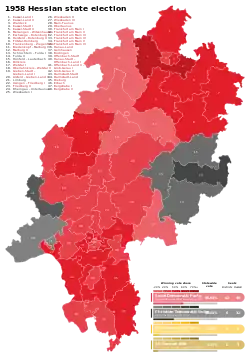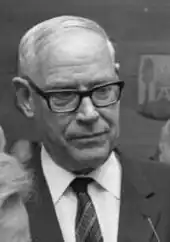1958 Hessian state election
The 1958 Hessian state election was held on 23 November 1958 to elect the 4th Landtag of Hesse. The outgoing government was a coalition of the Social Democratic Party (SPD) and All-German Bloc/League of Expellees (GB/BHE) led by Minister-President Georg-August Zinn.
| |||||||||||||||||||||||||||||||||||||||||||||||||||||||||||
All 96 seats in the Landtag of Hesse 49 seats needed for a majority | |||||||||||||||||||||||||||||||||||||||||||||||||||||||||||
|---|---|---|---|---|---|---|---|---|---|---|---|---|---|---|---|---|---|---|---|---|---|---|---|---|---|---|---|---|---|---|---|---|---|---|---|---|---|---|---|---|---|---|---|---|---|---|---|---|---|---|---|---|---|---|---|---|---|---|---|
| Turnout | 2,680,548 (82.3% | ||||||||||||||||||||||||||||||||||||||||||||||||||||||||||
| |||||||||||||||||||||||||||||||||||||||||||||||||||||||||||
 Results for the single-member constituencies. | |||||||||||||||||||||||||||||||||||||||||||||||||||||||||||
| |||||||||||||||||||||||||||||||||||||||||||||||||||||||||||
The election saw major losses for the Free Democratic Party (FDP) matched by gains for the SPD and Christian Democratic Union (CDU), which established itself as the major opposition to the SPD-led government. The FDP finished on 10%, its worst result since the inaugural postwar elections in 1946. The SPD's coalition partner the GB/BHE remained steady on 7%, and the government was renewed for a second term.
Electoral system
The Landtag was elected via mixed-member proportional representation. 48 members were elected in single-member constituencies via first-past-the-post voting, and 48 then allocated using compensatory proportional representation. A single ballot was used for both. An electoral threshold of 5% of valid votes is applied to the Landtag; parties that fall below this threshold are ineligible to receive seats.
Background
In the previous election held on 28 November 1954, the SPD suffered small losses and fell to 43%, but remained clearly the largest party. The CDU emerged as the second largest party by a small margin as the FDP fell to 20%. The GB/BHE ran independently and won 8%, subsequently forming a coalition with the SPD.
Parties
The table below lists parties represented in the 3rd Landtag of Hesse.
| Name | Ideology | Lead candidate |
1954 result | |||
|---|---|---|---|---|---|---|
| Votes (%) | Seats | |||||
| SPD | Social Democratic Party of Germany Sozialdemokratische Partei Deutschlands |
Social democracy | Georg-August Zinn | 42.6% | 44 / 96 | |
| CDU | Christian Democratic Union of Germany Christlich Demokratische Union Deutschlands |
Christian democracy | Wilhelm Fay | 24.1% | 24 / 96 | |
| FDP | Free Democratic Party Freie Demokratische Partei |
Classical liberalism | Heinrich Kohl | 20.5% | 21 / 96 | |
| GB/BHE | All-German Bloc/League of Expellees and Deprived of Rights Gesamtdeutscher Block/Bund der Heimatvertriebenen und Entrechteten |
National conservatism | Gotthard Franke | 7.7% | 7 / 96 | |
Results
| Party | Votes | % | +/– | Seats | |||||
|---|---|---|---|---|---|---|---|---|---|
| Con. | List | Total | +– | ||||||
| Social Democratic Party | 1,235,631 | 46.91 | +4.30 | 42 | 6 | 48 | +4 | ||
| Christian Democratic Union | 843,041 | 32.00 | +7.87 | 6 | 26 | 32 | +8 | ||
| Free Democratic Party | 250,310 | 9.50 | –11.02 | 0 | 9 | 9 | –12 | ||
| All-German Bloc/League of Expellees | 193,996 | 7.36 | –0.33 | 0 | 7 | 7 | 0 | ||
| German Party | 93,260 | 3.54 | +2.37 | 0 | 0 | 0 | 0 | ||
| Deutsche Reichspartei | 16,178 | 0.61 | New | 0 | 0 | 0 | New | ||
| German Community | 1,093 | 0.04 | New | 0 | 0 | 0 | New | ||
| German People's Party | 466 | 0.02 | New | 0 | 0 | 0 | New | ||
| Independents | 152 | 0.01 | +0.00 | 0 | – | 0 | 0 | ||
| Total | 2,634,127 | 100.00 | – | 48 | 48 | 96 | 0 | ||
| Valid votes | 2,634,127 | 98.26 | |||||||
| Invalid/blank votes | 46,691 | 1.74 | |||||||
| Total votes | 2,680,818 | 100.00 | |||||||
| Registered voters/turnout | 3,257,513 | 82.30 | |||||||
External links
- "The Election to the Hessian Landtag, 23 November 1958" (PDF). Parliamentary Data Bank of the Hessian Landtag (in German). February 1959. Retrieved 17 September 2023.
- "State election in Hesse, November 23, 1958". Hessian Regional History Information System (in German). Retrieved 17 September 2023.

